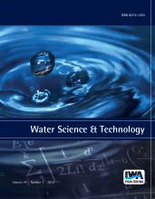
WATER SCIENCE AND TECHNOLOGY
Scope & Guideline
Connecting knowledge and technology for sustainable water practices.
Introduction
Aims and Scopes
- Water Treatment Technologies:
The journal emphasizes innovative technologies for water purification and wastewater treatment, including advanced oxidation processes, membrane filtration, and bioremediation techniques. - Sustainable Water Management:
Research on sustainable practices in water management, including resource recovery, water reuse, and the integration of green infrastructure to enhance urban water systems. - Water Quality Assessment:
Studies focusing on the assessment and monitoring of water quality, including the detection of emerging contaminants and the impact of pollutants on aquatic ecosystems. - Hydrological Modeling and Simulation:
Development and application of hydrological models to understand and predict water dynamics in various environments, including urban and rural settings. - Environmental Impact and Policy:
Research addressing the socio-economic and environmental impacts of water management policies, aiming to inform decision-making and regulatory frameworks. - Microbial Ecology in Water Systems:
Exploration of microbial communities in water treatment systems and their role in nutrient cycling, pollutant degradation, and ecosystem health.
Trending and Emerging
- Advanced Oxidation Processes (AOPs):
Research on AOPs is gaining traction, focusing on their effectiveness for degrading persistent organic pollutants and pharmaceuticals in wastewater. - Resource Recovery from Wastewater:
There is an increasing emphasis on technologies that recover valuable resources, such as nutrients and energy, from wastewater streams, reflecting a shift towards circular economy principles. - Machine Learning and AI in Water Management:
The integration of machine learning and artificial intelligence into water management practices is emerging as a significant trend, with studies focusing on predictive modeling and optimization of water treatment processes. - Microalgae and Biochar Applications:
The use of microalgae and biochar in wastewater treatment and environmental remediation is on the rise, highlighting their potential for sustainable solutions. - Impact of Climate Change on Water Resources:
Research addressing the effects of climate change on water availability, quality, and management strategies is becoming increasingly relevant and prominent. - Decentralized Water Treatment Solutions:
There is a growing interest in decentralized approaches to wastewater treatment, particularly in rural and underserved areas, as a means to enhance local resilience and sustainability.
Declining or Waning
- Traditional Wastewater Treatment Methods:
There is a noticeable decline in research focused solely on conventional wastewater treatment methods, as the field shifts towards more innovative and integrated approaches. - Basic Water Quality Parameters:
Research centered on basic water quality parameters (e.g., pH, turbidity) is becoming less frequent, with more emphasis being placed on complex interactions and the effects of emerging contaminants. - Single-Factor Studies:
Research that examines the effects of single factors on water treatment processes is waning, as there is a growing trend towards multi-factorial studies that consider interactions between various parameters. - Generalized Pollutant Removal Techniques:
The focus on generalized techniques for pollutant removal is decreasing, with researchers now prioritizing specific methods tailored to particular contaminants and conditions. - Historical Water Management Practices:
Interest in historical water management practices is declining, as contemporary research increasingly emphasizes innovative solutions and technologies.
Similar Journals

ACS ES&T Water
Exploring the intersection of chemistry and environmental science.ACS ES&T Water, published by the American Chemical Society, is a leading peer-reviewed journal focused on the interdisciplinary field of water science and technology. Since its inception in 2021, the journal has rapidly established itself as a prominent platform for research, boasting an impressive impact factor and ranking in the Q1 category across various disciplines, including Chemical Engineering, Chemistry, Environmental Chemistry, and Water Science and Technology. With a current Scopus rank of #66 out of 261 in Environmental Science and a remarkable percentile of 74%, ACS ES&T Water is dedicated to advancing the understanding of water-related challenges and solutions through high-quality research. The journal aims to facilitate communication among researchers, professionals, and policymakers by providing open access to innovative studies and methodologies that address critical issues in water resource management and sustainability. Collaborating at the intersection of chemistry and environmental science, this journal is essential for anyone invested in the future of global water security and innovation.

E-Water
Championing Environmental Sustainability in Water PracticesE-Water, published by the European Water Association, is a leading academic journal focused on the multifaceted field of water resource management and environmental sustainability. With the ISSN 1994-8549, this journal serves as a vital platform for researchers, professionals, and students dedicated to advancing knowledge in water science and related areas. Although currently not an Open Access journal, E-Water provides in-depth peer-reviewed articles, ensuring high-quality research dissemination. The journal is committed to showcasing innovative studies on water quality, conservation, and policy-making, making significant contributions to the field of water management both locally and globally. As water scarcity and environmental challenges continue to rise, E-Water stands as an essential resource for those involved in the stewardship of our most vital natural resource.
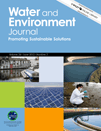
WATER AND ENVIRONMENT JOURNAL
Connecting academia and policy for a cleaner tomorrow.WATER AND ENVIRONMENT JOURNAL is a prominent interdisciplinary journal dedicated to the latest research and advancements in the fields of water resources, environmental engineering, and pollution management. Published by WILEY, the journal has established itself as an essential resource for academics, practitioners, and policymakers since its inception in 1987. With an impressive impact factor reflecting its robust influence, it ranks in the Q2 and Q3 quartiles across multiple categories, including Water Science and Technology, Environmental Engineering, and Management, Monitoring, Policy and Law. The journal welcomes high-quality research articles, reviews, and case studies that address the critical challenges facing water and environmental sciences. As an open access publication, it provides a platform for widespread accessibility and engagement, ensuring that the knowledge generated is disseminated to a diverse audience. With a commitment to advancing understanding and solutions in water-related issues, WATER AND ENVIRONMENT JOURNAL plays a crucial role in shaping the future of environmental research and technology.
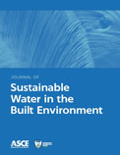
Journal of Sustainable Water in the Built Environment
Pioneering knowledge for resilient water systems in cities.The Journal of Sustainable Water in the Built Environment, published by the American Society of Civil Engineers (ASCE), is a pivotal platform dedicated to advancing knowledge and practices in the fields of water resource management and sustainable infrastructure. Since its inception in 2015, the journal has adopted a rigorous approach to publishing high-quality research and reviews, as evidenced by its Q2 ranking in both Management, Monitoring, Policy and Law and Water Science and Technology categories as of 2023. With an ISSN of 2379-6111, the journal plays a critical role in shaping policies and innovative technologies that address the unique challenges associated with water sustainability in urban environments. Located in the United States, it attracts a diverse audience of researchers, professionals, and students focused on interdisciplinary solutions. Although it follows a traditional publishing model, the journal is committed to making impactful contributions to the academic community and beyond, fostering collaboration and knowledge exchange through its publications. Address all correspondence to 1801 Alexander Bell Dr, Reston, VA 20191-4400.

Water Reuse
Elevating Water Science to Meet Tomorrow's Challenges.Water Reuse is a pioneering journal dedicated to advancing the field of water science and technology, particularly focusing on innovations in water recycling and reuse strategies. Published by IWA Publishing in the United Kingdom, this journal has quickly established itself as a vital resource for researchers, professionals, and students engaged in sustainable water management practices. With an impressive impact factor and a ranking that places it in the top quartile for both Water Science and Technology and Filtration and Separation, Water Reuse offers an open-access platform that fosters the dissemination of high-quality research. Since its inception in 2021, it has garnered attention for its commitment to addressing critical global challenges related to water scarcity and environmental sustainability. The journal provides a crucial forum for the exchange of knowledge and best practices, contributing significantly to the advancement of water reuse methodologies. By encouraging interdisciplinary collaboration and the publication of pioneering studies, Water Reuse is poised to play a central role in shaping the future of water management.
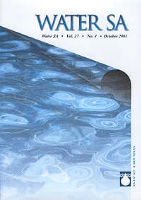
WATER SA
Connecting research and innovation in water management.WATER SA, published by the WATER RESEARCH COMMISSION, serves as a pivotal platform for interdisciplinary research in the areas of water science and technology. With an ISSN of 0378-4738 and an E-ISSN of 1816-7950, this open-access journal has been committed to disseminating knowledge since 2005, ensuring that research is freely accessible to a global audience. As of 2023, it holds a Q3 ranking in several key categories including Applied Microbiology and Biotechnology, Management, Monitoring, Policy and Law, Waste Management and Disposal, and Water Science and Technology. These rankings reflect its significant contribution to these disciplines, particularly in South Africa where it is based. With a history dating back to 1976 and converging research efforts extending through 2024, WATER SA aims to illuminate pressing water-related challenges and foster innovative solutions through rigorous scientific inquiry. Researchers, professionals, and students interested in the sustainability and management of water resources will find its comprehensive portfolio essential for advancing their work and understanding in an increasingly critical field.

Asian Journal of Water Environment and Pollution
Pioneering strategies for a pollution-free future.Asian Journal of Water Environment and Pollution is a leading academic journal published by IOS PRESS, dedicated to advancing the field of water science and technology, as well as pollution management. With its ISSN 0972-9860 and E-ISSN 1875-8568, this journal serves as a pivotal platform for researchers, professionals, and academics alike who are keen to explore innovative solutions and interdisciplinary approaches toward water-related challenges and environmental issues. Although currently positioned in the Q4 category for both pollution and water science & technology, the journal aims to foster impactful research and discussions that can enhance the understanding and treatment of water pollution. The Asian Journal of Water Environment and Pollution not only plays a crucial role in disseminating knowledge but also encourages the sharing of findings from unique geographic perspectives, particularly from Asia. As the field evolves, this journal is poised to become a vital resource for those looking to contribute to sustainable water management practices and pollution reduction strategies.

Water Resources
Advancing sustainable solutions for our most vital resource.Water Resources, a prominent journal published by MAIK NAUKA/INTERPERIODICA/SPRINGER, focuses on the critical and evolving field of water science and technology. Established in 1976 and with a long-standing commitment to advancing knowledge, this journal explores interdisciplinary research that addresses the challenges surrounding water resource management, quality, and sustainability. With an impact factor positioned within the Q3 category of its field, it holds a notable Scopus rank (#181/261) in Environmental Science, emphasizing its role in driving scholarly discourse. While currently not open access, Water Resources provides vital insights for researchers, professionals, and students, making it an essential resource for those seeking to innovate and implement effective water management solutions. To stay ahead in a domain that is increasingly paramount to global sustainability efforts, consider engaging with the latest research published in this vital journal.
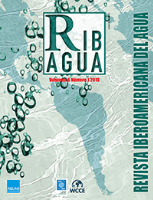
RIBAGUA-Revista Iberoamericana del Agua
Pioneering research in hydrology and environmental science.RIBAGUA-Revista Iberoamericana del Agua is an esteemed academic journal dedicated to the study and dissemination of water-related research within the Ibero-American context. Published by TAYLOR & FRANCIS LTD, this Open Access journal has been providing a platform for scholarly articles since 2015, promoting visibility and accessibility for researchers, professionals, and students engaged in environmental science, hydrology, and water resource management. With the objective of enhancing the understanding of water issues affecting the Ibero-American region, RIBAGUA invites contributions that address innovative practices, policy implications, and scientific advancements. By fostering inter-regional dialogue and collaboration, it stands as a vital resource for those looking to contribute to sustainable water management solutions. The journal is committed to maintaining high standards of academic integrity and is ideal for anyone seeking to advance their knowledge and research in the water sciences.

Water Conservation Science and Engineering
Innovating Tomorrow's Water Conservation StrategiesWater Conservation Science and Engineering, published by SPRINGERNATURE, is a vital academic journal dedicated to advancing the fields of environmental engineering, ocean engineering, waste management, and water science and technology. Since its inception in 2016, the journal has quickly established itself within the academic community, achieving a commendable Q3 ranking across multiple categories in 2023. With an ISSN of 2366-3340 and an E-ISSN of 2364-5687, it is accessible to a global readership eager to explore the latest research and innovations in water conservation and sustainable practices. Although currently not open access, the journal is committed to publishing high-quality scholarly articles that provide insights into effective water management strategies, innovative engineering solutions, and the critical importance of preserving our water resources. Based in Singapore, Water Conservation Science and Engineering aims to foster interdisciplinary collaboration among researchers, professionals, and students, making it an essential resource for anyone passionate about environmental sustainability and preservation.